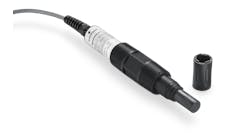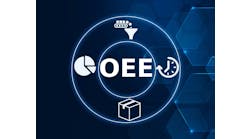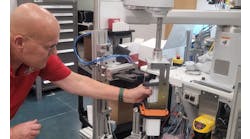Keith Larson, publisher of Control and ControlGlobal.com, is joined by Rachael Conrad, VP and GM for customer support and maintenance, Rockwell Automation, and Matthew Fordenwalt, VP and GM for systems and solutions, Rockwell Automation to discuss industrial asset management lifecycles and the upcoming Automation Fair.
Transcript
Keith Larson: Hi, this is Keith Larson publisher of Control magazine and control global.com. Welcome to this Solutions Spotlight edition of our Control Amplified podcast. The topic at hand is the industrial asset life cycle, and how asset owners can ensure that they derive the optimal value from those assets from the earliest stages of design through long-term sustainment of production capabilities.
To help illuminate this important issue, I'm pleased to have join me Rachel Conrad, vice president and general manager of customer support and maintenance for Rockwell Automation, as well as Matt Fordenwalt, vice president and general manager for systems and solutions, also of Rockwell Automation. Welcome Rachel, Matt – thanks for joining us.
Well, just to start things off, the topic of lifecycle services means a lot of different things to different people. I think for many industrial automation suppliers that term really refers to the help they offer their customers in managing the lifecycles just of those automation assets—the PLC or the software that's installed in their facilities. While that's certainly important I know that Rockwell Automation takes a much broader view. Can you expand a little bit on the scope of your offering?
Rachael Conrad: I'll get started, then feel free to add on, Matt, if that's all right. At Rockwell Automation, we think about how we can best help our customers with their challenges and deliver the business outcomes that they need. We think about lifecycle as the lifecycle of their plant or the life cycle of their process—not just the lifecycle of those automation assets. I think the other piece is that we recognize that in any plant or process, it's not going to be just Rockwell Automation assets that are there. So we have to be able to support our customers with all different types of technology all different types of vintages. That’s really how to how we take a broader view and deliver more value for the customers.
Matt Fordenwalt: I would agree, Rachel. Lifecycle services from Rockwell Automation are not just your industrial automation assets. It's also the people who are supporting your operations and their knowledge of your industry, your application and your operations—how do we support those people as well? And then how do we help you get the most effective business outcomes through your investments in those assets. So, we have capabilities to help you improve your assets at the design-build stage. Or modernize those assets then sustain the output you're looking for. And that's a combination of our industry expertise, our technology expertise, and our actual application expertise as well as operational expertise. That's not just focused on Rockwell Automation content. It's also extends to other machinery, other brands, and more importantly to the people in the facility who are extracting value from your investments.
KL: So there's an acknowledgement of the training that's required to allow your customers to get maximum value from their investments, as well as an acknowledgement of the heterogeneous, multi-vendor automation environments that are so common.
RC: Just add to that, the capabilities we offer look different depending on where customers are in that lifecycle. So, there's anything from the different types of consulting services that we have relative to standing up a new plant, or maybe building a Connected Enterprise or working through a digital transformation. Then there are the professional services we provide to help package and modernize equipment, when we act as a main automation contractor. Those are examples of Professional Services.
We also have a Connected Services offering which is all about the OT space—from designing networks to a full OT cybersecurity program rollout across the globe. And then there are more traditional services such as for maintenance and asset repair but also around analytics. Support services such as for onsite and remote technical support and training fall into that bucket. So you can see that depending on where customers are and what their needs are, it’s really a full offering across the lifecycle.
KL: Rockwell Automation of course has a very enviable partner ecosystem, many of which provide these sorts of front-line design, integration and implementation services on behalf of industrial end users and machine builders. How does Rockwell Automation collaborate with those other companies to help meet your mutual customers’ needs?
MF: Obviously, Rockwell has a large ecosystem of OEMs and system integrators. We have services from a lifecycle standpoint to coordinate across our partners to ensure faster startup or commissioning of new machines or applications across a large swath of machinery. We also have the capabilities to bring that data into our managed services and partner with those companies in the ecosystem to ensure that we are applying the right skills and talent to support each aspect of the machinery operation within that facility or application. So if you think about our ability to partner with an OEM or Encompass partner, it's not just on the technology side. We have the ability in that sustainment stage—after commissioning—to also integrate support contracts and be able to distribute the right resource with the right skills at the right time to that facility based upon the partnership needs. Understanding, of course, that no single vendor can be everything to everyone.
RC: Yeah, I echo that, Matt. We place very high value on our partners and we need them to be successful. We need them to help Rockwell be successful, and our customers need an ecosystem of people working on their behalf to support them. The heart of true collaboration is acknowledging when you aren't the proper fit to do everything for a customer, but you also know what you're good at, what is complimentary. And then this ecosystem that we’ve built with our partners allows us to bring the right people to the table at the right time: it can look seamless and it should feel seamless to our customers that we are all working towards a common goal.
MF: I'll just give you a real life example. We have many customers today—hundreds if not thousands of plants—that rely on our sustainment services from our remote support or connected services groups. These support contracts are proactive. They're monitoring the IT and OT infrastructure from the network in that facility to the industrial data center to those all those heterogeneous OT nodes—an Allen-Bradley PLC, a Rockwell Automation drive, or a competitive automation asset. But with one call to our support center, we're able to have a single service ticket that goes across multiple partners, a Cisco switch, a VMware host, or a Rockwell Automation PLC. You're talking to a degreed engineer to trouble troubleshoot your issue, or that engineer may have proactively called you based on something that we've analyzed and determined that needs to be done. Our goal is to simplify that customer experience and federate that across multiple different partners so that the customer is not burdened with asking “Who do I go to for what?”
KL: That makes perfect sense. Certainly, the more that you can do to simplify the management of these increasingly complex, interconnected and heterogeneous environments on behalf of your customers is to be applauded.
RC: This is sort of support is also important for OEMs. Take a packaging equipment manufacturer that is based in North America but whose equipment is being shipped all around the world. They may not have support resources in other countries or the ability to send those resources quickly to support end customers. It’s an example of another way we work together with our ecosystem to so support the OEM themselves, or the end user because they're in a country that the OEM might not have the capability to travel to. We have thousands of local resources globally and can provide great value.
KL: Well, I think that's about the time that we have. I really want to thank you, Rachel, and thanks, Matt, for taking the time to talk lifecycle services with us today. If you in our audience are interested in a deeper dive into the Rockwell Automation lifecycle offering it, I’d recommend you consider attending the upcoming 2019 Automation Fair, to be held November 20th and 21st in my hometown of Chicago. And if you happen to be focused in the process Industries, including batch industries such as the life sciences or food & beverage, I’d further encourage you to check out the Process Solutions User Group conference to be held Monday and Tuesday of Automation Fair week. It really digs deeply into many topics of interest to process manufacturers, including a track specifically focused on lifecycle issues. Rachael, would you care to share a bit more about what’s on tap for Automation Fair and PSUG this year?
RC: Sure. We'd love to see you see everyone at Automation Fair in Chicago. As was mentioned, the Automation Fair itself is Wednesday and Thursday, November 20th and 21st. There are lots of technical sessions that you can attend, but we have a large show floor, including a Rockwell Automation booth focused on lifecycle services. Come talk to Matt and me, and our subject matter experts about lifecycle services. You can learn more right there and talk to the people that are doing it every day. Also, our Process Solutions User Group meeting is that Monday and Tuesday, November 18th and 19th. There's a full track of presentations on asset lifecycle, as well as cybersecurity and our PlantPAX DCS system and its application. So, please check out the Process Solutions User Group as well.
KL: I'm Keith Larson, and you've been listening to Control Amplified. Thanks for joining us, and if you've enjoyed this episode, you can subscribe to future episode through the iTunes Store or Google Play, plus you can find the full archive of past episodes at controlglobal.com. Signing off until next time. Thank you, Matt, thank you, Rachel, and we'll see you in Chicago.
For more, tune in to Control Amplified: The process automation podcast
Latest from Asset Management

Leaders relevant to this article:






